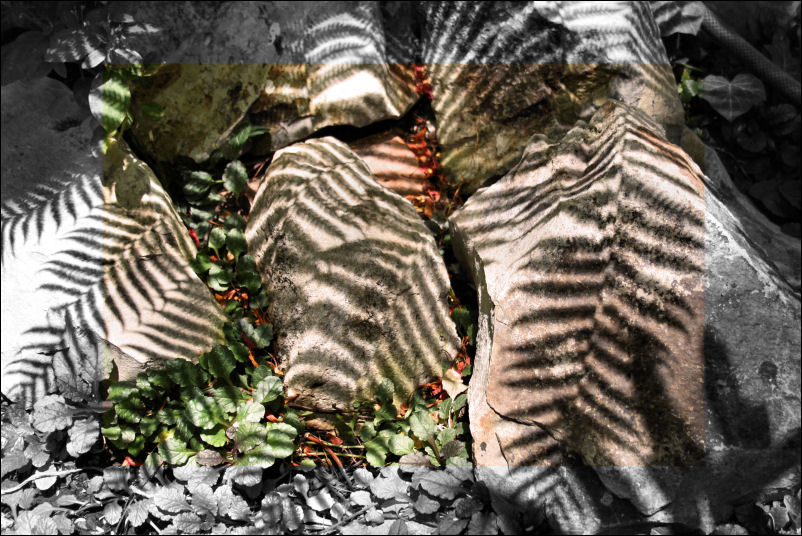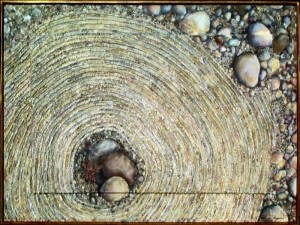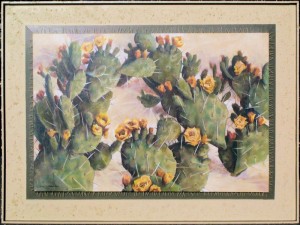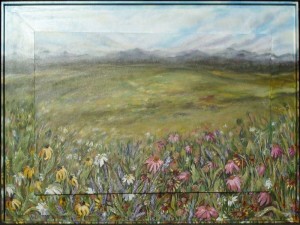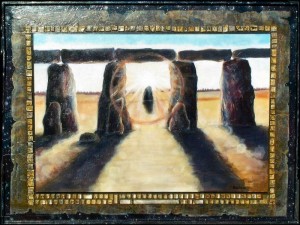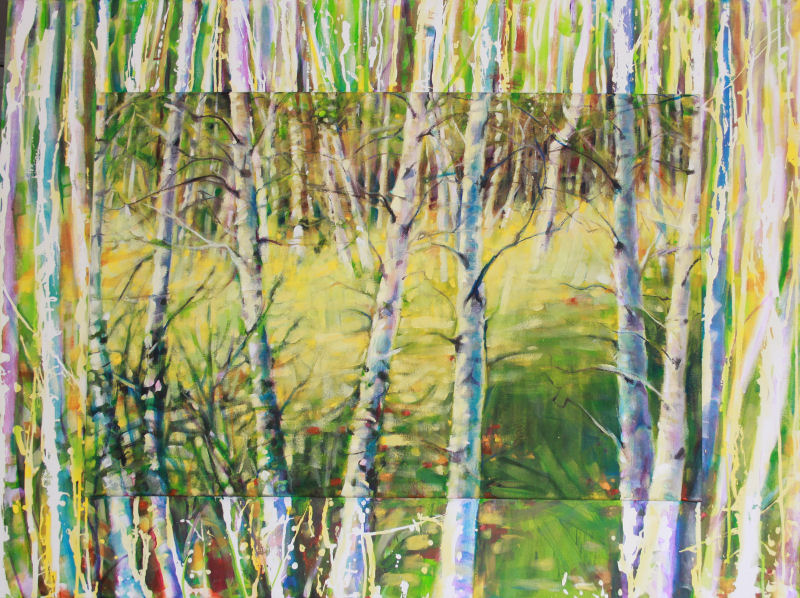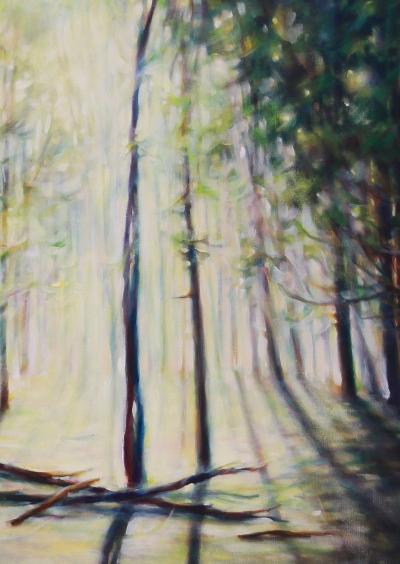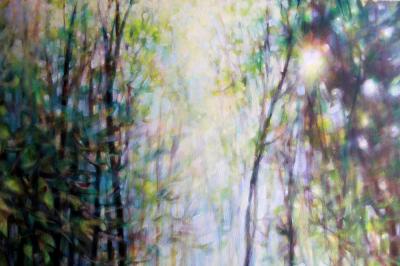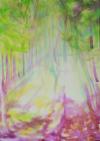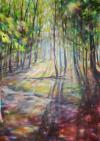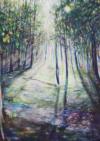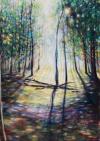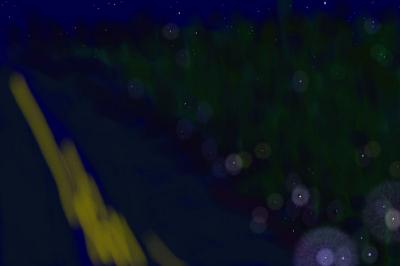landscapes
« Previous Entries Next Entries »Missing routine
Thursday, October 11th, 2012
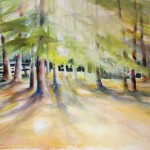 The Campsite, 24 x 30 inches watercolors on 140 lb cold pressed premium
The Campsite, 24 x 30 inches watercolors on 140 lb cold pressed premium
I finally brought my watercolor paints back from my son’s place in Canada, where I left them so they wouldn’t freeze on the 5-day drive back west last November. Driving again, I’ve just returned from this year’s visit, when I gave my grandson a one-of-a-kind fabric book hand-made for his first birthday, Colors for Cameron. I plan to make him something special every year.
So, with a couple of new brushes and 12 x 16″ paper block, and now with the rainy season upon us back in Oregon, I look forward to establishing a routine of painting again. Invigorated by a summer full of gardening and flowers, the stunning scenery across America this time of year, plus reviewing archives of work I haven’t seen for ages, I’m all set to splash out some new watercolors. Our Portland house is a renovator’s dream/nightmare!, and we’re not out of the woods yet. Attempting to focus more on art than house, smaller paintings are more manageable and less of a production than my typically large canvas paintings…however, I’m curious to experiment and see how watercolors behave on primed canvas at some point!
True colors
Thursday, May 26th, 2011
Tree fern shadows cast across garden rocks in Chapala, Mexico
“Your true colors are beautiful” – Cindy Lauper
I’ve been in Mexico for the past two weeks, so I’ll be contributing more images to the True Colors website, created in 2007 as tribute to the colorful landscapes and cultures here. Developed separately from the other chapters of nikkiartwork.com, trucolors.info is considered as one complete and independent project. I’ve posted a few more of the recent pieces in this series on nikkiphotography.com
Stepping Stones
Friday, March 25th, 2011
While I was in Portland two weeks ago, starting the Texas-Oregon relocation process, I completed five new Zen Gardens, filling a request for one. All five are smaller, slightly different versions of ones made previously. Four are shown in thumbnail images below.
The very first Zen Garden was created in 2000 as part of a four-painting commission. The ideas established in that set foreshadowed new routes to trying methods I hadn’t before, like enhancing my paintings with 3D elements. That set is also the origins of the “box frame” design that I’ve used on several other paintings since then, where each main canvas is mounted on a wood platform, framing the work with about four inches of extra play-space.
Whereas some frames have the effect of abruptly ending a composition, this type of frame enables space for the subject to continue, softens the edges and adds an interesting twist to the overall impression. When items related to the main subject are placed in that area it adds dimension, not just in the physical sense, but also in the conveying of any abstract or symbolic stories beyond the presentation of the main painting inside.
Because of the challenges acheived in those paintings, 1) a series was born that I’ll continue with for the rest of my days. In 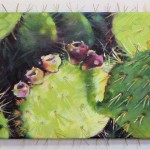 2) Prickly Pear Cactus, pins were applied around the main central frame, then painted. The smaller canvas done during 2005 (left) borrowed this technique, and the same principle of attaching things to the main frame can be used with any number of objects.
2) Prickly Pear Cactus, pins were applied around the main central frame, then painted. The smaller canvas done during 2005 (left) borrowed this technique, and the same principle of attaching things to the main frame can be used with any number of objects.
In 3) Alpine Meadows, I learned to use all the qualities acrylic paints offer by watering down the consistency for the distant mountains, then sculpted the flowers and grasses with a palette knife on the lower portion. Finally, the theme of 4), The Evolution of Communication has intrigued me ever since, but I still haven’t fully pursued the possibilities. This is the perfect means to learn about Art History hands-on by attempting to recreate it in some form, then to share that adventure and ideally, inspire interest in the topic at the same time. Two old keyboards have been collecting dust in my studio closet for a number of years, yet to be disassembled and incorporated into a new series of work with similar associations.
~
Some of our peers advocate that if we don’t concentrate our efforts to learn one medium well, we will never excel in any. They are right of course, in many respects, but scores of artists are not content with singing just one note. Some simply cannot. To be fair, what works for one does not work for another. Each of the above paintings are examples where a combination of skills and different media in one piece can be very effective. I’m here to say that integration is possible! It’s a longer, meandering road..but it is possible.
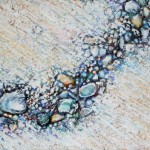 There are so many different paths artists can take, long and short term; opportunities every day. There are endless kinds of subjects, ready-made and unconventional materials, always something to start or finish, new methods to explore, and an overabundance of ideas to attempt in one lifetime. Self discipline is the order of every day, either to start working or know when to stop.
There are so many different paths artists can take, long and short term; opportunities every day. There are endless kinds of subjects, ready-made and unconventional materials, always something to start or finish, new methods to explore, and an overabundance of ideas to attempt in one lifetime. Self discipline is the order of every day, either to start working or know when to stop.
My philosophy is that doing something, unless naturally in need of rest, is better than doing nothing. However, being overly ambitious in too many areas is also how I, along with millions of other artists end up with a variety of different kinds of art (or just stuff!), and the arguements endorsing one type of study come into play. Should we restrain ourselves when it comes to making “stuff”? Why is consistency given more support than variety when it comes to showing and selling art?
Whatever choices we make; whichever direction we take depends mostly on the intention for the finished products. Who is it for, do you want it to sell it, where, how, and how quickly? Was work done as a personally cathartic process, as a lot of art is? …or is it just a thing with no emotional attachments or brainy messages? Artists who support themselves by offering a range of services, satisfied and busy enough by word-of-mouth sales, do well jumping from medium to medium. If the hope is selling work through galleries and art dealers though, what some call “too many voices” are apt to be a disadvantage. 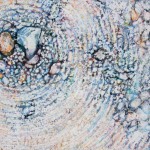
In one of his recent articles, Robert Genn writes sensitively about multi-media artists. While he supports that “for artists, exploration is like oxygen” and that “the nature of our game is to be distracted by our muse”, he also recommends that artists must present consistency in our approach if gallery exhibition/sales is what we pursue.
When a gallery represents an artist, they expect an overall consistent look and a clear statement. Where venues sell a number of artists’ work, the ambiance cannot be one that resembles a yard sale. If potential buyers view too many styles, subjects or media in one place or by one artist, they tend to lose interest, resort to window shopping, and walk away empty-handed.
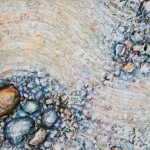 I can relate to that: the effect is like standing in the toothpaste isle at the pharmacy, where the senses are bombarded with colorful packaging, alluring titles and fine-print promises. Assuming beforehand that the choice would not be anything but simple, there have been times when I’ve said ‘forget it’ and gone back another day. With art sales though, you don’t want buyers to come back another day, because it may not be your art they choose then.
I can relate to that: the effect is like standing in the toothpaste isle at the pharmacy, where the senses are bombarded with colorful packaging, alluring titles and fine-print promises. Assuming beforehand that the choice would not be anything but simple, there have been times when I’ve said ‘forget it’ and gone back another day. With art sales though, you don’t want buyers to come back another day, because it may not be your art they choose then.
Gallery owners and dealers do not do us any favor if they display too much variety in typically limited spaces, so Mr. Genn has an excellent suggestion: bring art done in different medias to different galleries.
He also says to keep working no matter what.
Artists have a strong sense of mission. Periodically it needs reevaluation, and with that bigger picture clear, we create the way as it unfolds before us. If we are serious about selling, we first need to become familiar with what we are best at, what we love, what works and what doesn’t. We need experience in order to learn – that takes time – and there’s no getting around it. Experimentation is fundamental to this profession, but if it’s intended to be sold to others and by others, simplifying the look and clarifying the purpose of our art is crucial.
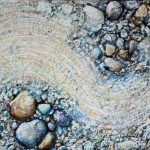 A viewer at one of my exhibitions commented, “You’re all over the place, arentcha?!” As disturbing as that was, it’s true and I needed to hear it, eventually concluding that I do need to clean up my act, but at the same time this is how I work. This is how my stuff works. Every so often there are paintings or a series of works that encompass all that’s been learned and all that I’m capable of; breakthroughs that define a solid new direction or validate the existing one. The commissioned set of paintings described above were like that, and their significance is still an influence on today’s work and will be on tomorrows’ too. They verified that I’m on the right path even though much of the time is spent off of it, experimenting. I call it serious play and paying attention… “playing attention”! Once in a while the bits and pieces come together in one big rewarding “Eureka!”.
A viewer at one of my exhibitions commented, “You’re all over the place, arentcha?!” As disturbing as that was, it’s true and I needed to hear it, eventually concluding that I do need to clean up my act, but at the same time this is how I work. This is how my stuff works. Every so often there are paintings or a series of works that encompass all that’s been learned and all that I’m capable of; breakthroughs that define a solid new direction or validate the existing one. The commissioned set of paintings described above were like that, and their significance is still an influence on today’s work and will be on tomorrows’ too. They verified that I’m on the right path even though much of the time is spent off of it, experimenting. I call it serious play and paying attention… “playing attention”! Once in a while the bits and pieces come together in one big rewarding “Eureka!”.
Framing on Northern Delights 02 update
Tuesday, December 14th, 2010
Northern Delights 02, 24H x 36W inches acrylics on canvas, adhered to a 36H x 48W x 1D inches canvas. Mask/resist medium was used to maintain white spaces and pure colors in both sections.
The central painting was started in 2006, and the framing was resolved today – a perfect example where some paintings just need to hang around for a while before they are well and truly finished. The scene of the central painting is extended onto the larger canvas, initially intended to have the same style. However, after stopping for a coffee break then coming back with fresh eyes, I actually like the clash of styles. I always say that art is the best place to exhibit any rebellious tendencies! Besides, formal frames can sometimes cut off the energy of a composition too abruptly. Every painting does not need a frame, but finishing the edges should always be considered.
Morning Light – commission for a second version
Wednesday, September 8th, 2010
Above: Sept. 12th detail
Morning Light 02, above: upper detail of 60H x 40W x 3D inches acrylics on canvas in progress, commissioned work (NFS)
Phase 01, 03 and 07 show various changes and adjustments made as I attempt to paint Morning Light 02 as close as possible to the original version. As this is a unique individual painting in its own right, copying is not the goal. As work progresses, the most important thing is to find the same light and ethereal qualities as in the first version.
Summer travels
Friday, August 13th, 2010
When I’m back in Dallas blogging regularly again, these photos will be posted on the photography website. An unplanned extra trip from Alberta to Ottawa; in Ontario a second time, means I won’t be back until the first week of Sept. Here are a few photos I took on the shores of Lake Superior just east of Wawa, ON.
On exhibit
Friday, July 9th, 2010
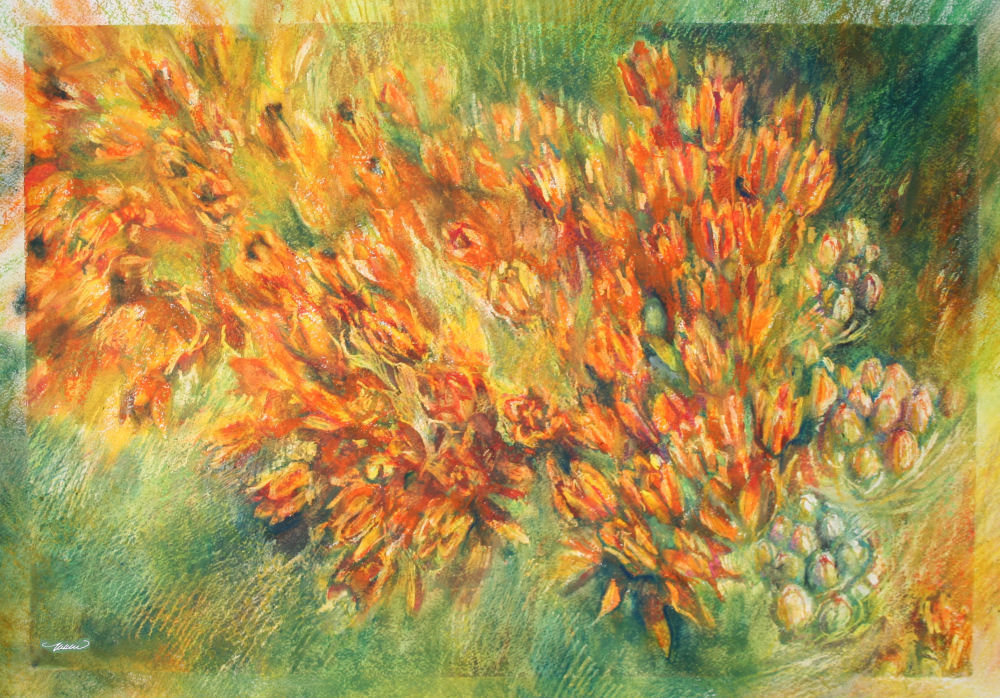
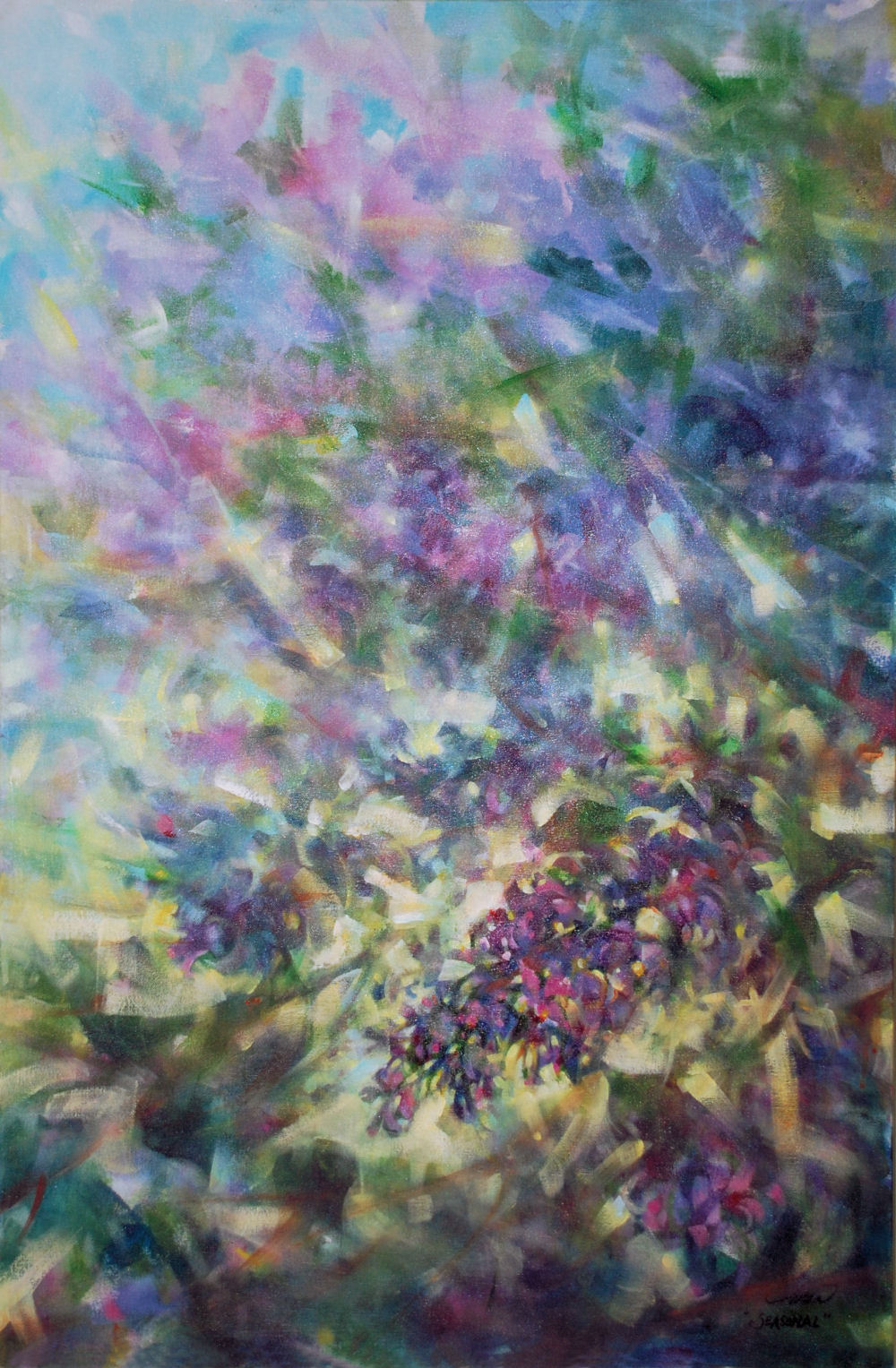
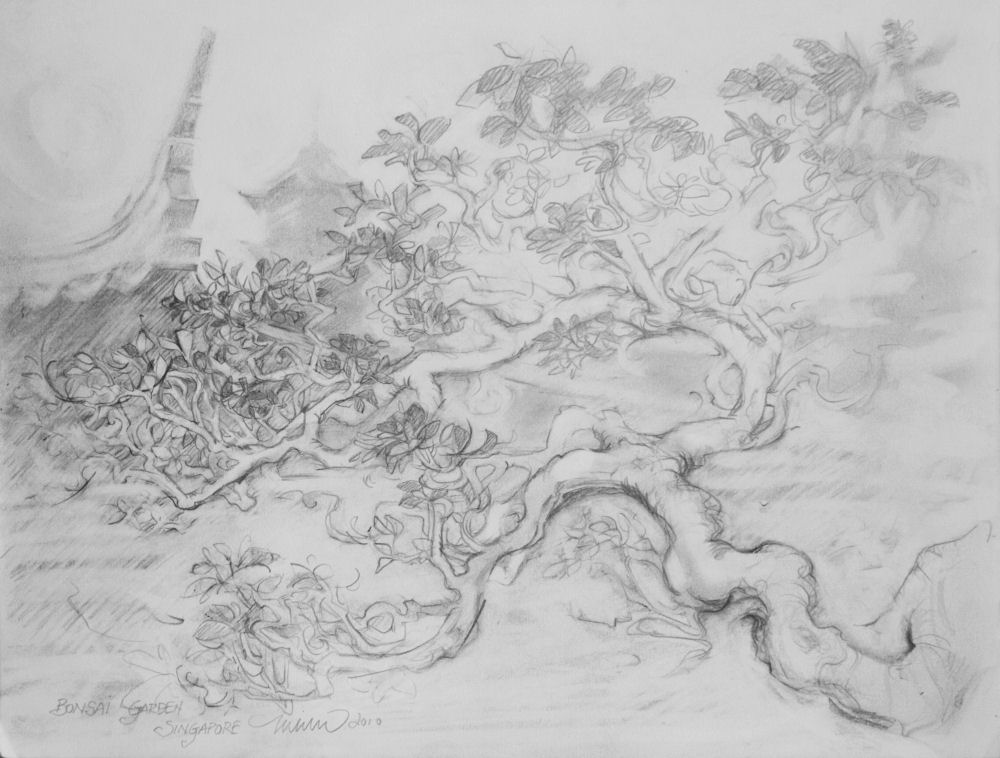 On exhibit at Oxide Gallery, Denton, TX are: Milkweed Melody, 27H x 33W inches framed Oil Pastels on WC paper, has brassy-gold frame painted with an extension of the drawing. Bonsai Garden, 12 x 15 inches graphite on paper, and Lilacs, 36 x 24 x 2 inches acrylics on canvas, gallery wrapped sides painted, narrow frame, which can be displayed horizontally or vertically.
On exhibit at Oxide Gallery, Denton, TX are: Milkweed Melody, 27H x 33W inches framed Oil Pastels on WC paper, has brassy-gold frame painted with an extension of the drawing. Bonsai Garden, 12 x 15 inches graphite on paper, and Lilacs, 36 x 24 x 2 inches acrylics on canvas, gallery wrapped sides painted, narrow frame, which can be displayed horizontally or vertically.
Stars and Fireflies
Sunday, June 27th, 2010
Home from Singapore for a few days, and having to go north to pack up the Dancing With Trees exhibition, I drove up to Ontario first so I could see my sons in Canada before Christmas. At night in the fields and trees from Tennessee to Michigan there are stars and fireflies in the trees – so magical! Until I can express it in paint, here is a quick photoshop impression.
Bonsai Garden, Singapore
Saturday, May 29th, 2010
Bonsai Garden, Chinese and Japanese Gardens, Singapore, 9H x 12W inches graphite on paper, white mat and 15H x 18W inches white frame with crackle finish.
Dancing With Trees Art list for Madison, WI
Friday, April 16th, 2010
 |
 |
 |
 |
 |
 |
 |
 |
 |
 |
 |
 |
 |
 |
 |
 |
 |
 |
 |
 |
 |
 |
 |
 |
Paintings as shown are not to scale in comparison to one another
The Dancing With Trees Art Exhibition celebrates the importance of trees and forests throughout history, portraying their diversity and relationships through a variety of creative associations. Twenty three of the paintings in this collection are on exhibit in the Steinhauer Trust Gallery at the University of Wisconsin-Madison Arboretum, May 1st through June 30th, 2010. Opening Reception Saturday May 1st, 12:45 – 4:00 p.m.
All life forms on this planet proliferated, continue to flourish, and ultimately depend on the existence of trees. While the message is urgent, I consider humanity’s role on the planet as positive, with the statement that creativity is our greatest asset; that “Our carbon footprint is worthy”. Further, creative thinking is our most primal, yet highly advanced and ever-evolving contribution toward solutions to healing wrongs done and changing ingrained habits to ones that are more appreciative of the environment in general.
Purchase Art here
« Previous Entries Next Entries »

